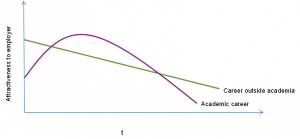Can you postdoc for too long? It’s a question I’ve been asked many times by clients trying to negotiate their career path. You can break their concerns down in to two further questions: How many years should you postdoc before securing an academic job becomes unlikely? And: How many years can you postdoc before employers outside of academia are no longer interested in you?
I love a nice graph, so I’ve attempted to use one to represent the assumptions I think a lot of postdocs make about these questions:

We can probably agree that during the early part of your postdoc career, you need to take time to build your research track record and reputation in order to make yourself attractive for permanent academic positions, but after an unspecified period of time you might find it harder to get more independent positions as you become ineligible for early career fellowships or selection panels question why you haven’t yet obtained a permanent position. We’re also assuming that during this time you’re becoming increasingly unattractive to employers outside academia as you become so highly specialised. These are sweeping generalisations, of course, but the strategic question is valid: at what point do you know when to stop trying one path so you can maintain your ability to switch to a different one?
If you’re in the first few years of your postdoc career, then my message for you is ‘get planning’. If you’re a little way further along that t-axis, my message for you is ‘don’t panic’. In either case, we’re here to help you.

If you’ve got time on your hands and you can still see an upward trajectory for your academic career, keep up the good work, but don’t neglect your other options. At this stage, you don’t need to commit to any other career path, but if you have a bit of a sense of what you could do outside of academia, it will help mitigate the panic if things don’t work out quite the way you had planned, and it can help you make the most of your time by signposting you to useful activities and networks that could help you to access these roles in the future. Our previous blog posts about deciding your direction will help you with this.
If you’re a little further along the postdoc path, don’t worry, we have lots of examples of postdocs who have made a career change after several research contracts. They key to success here is creating a positive narrative about the change – what’s motivating you? It may well be that you’ve realised that academia isn’t going to work out, and you feel like this change is being forced on you, but an employer isn’t going to see that as a valid reason to recruit you. You need to demonstrate genuine enthusiasm for the role, and this means doing your research beforehand, finding out about the employer and the sector, and what the hot topics are. If you’ve taken the time to do this, through wider reading and speaking to people in the sector, you’ll convince employers that you really want to make this change.
Career change can be challenging at any stage; accepting you need to make a move and working out what you might do next takes some thought. The Postdoc Careers Service is here to help you with any aspect of that process – come and see us if you’d like to talk it over. We can absolutely reassure you that it’s never too late to change direction.
Liz Simmonds, Postdoc Careers Adviser


